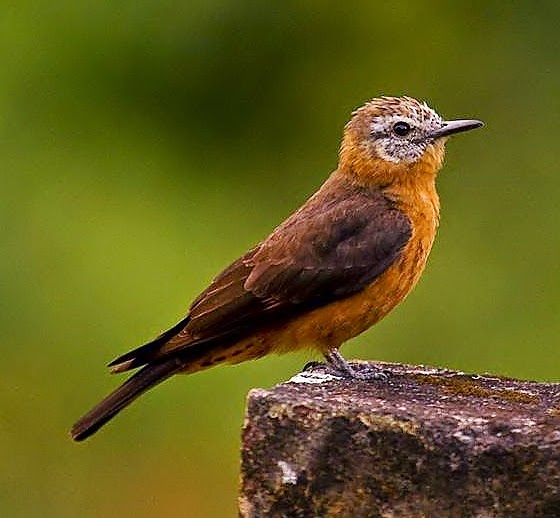 |
| Photo by Dusan Brinkhuizen (Internet Bird Collection) |
Common name:
cliff flycatcher (en); gibão-de-couro (pt); moucherolle hirondelle (fr); birro castaño (es); schwalbentyrann (de)
Taxonomy:
Order Passeriformes
Family Tyrannidae
Range:
This species has a disjunct distribution. Subspecies H.f. ferruginea found in the northern Amazon basin, in south-eastern Colombia, southern Venezuela, the Guyanas and north-western Brazil. H.f. sclateri is found along the eastern slopes of the Andes from Venezuela to southern Peru. H.f. pallidor is found from northern Bolivia to western Paraguay and north-western Argentina. Finally, H.f. bellicosa is found in the southern half of Brazil, into eastern Paraguay, Uruguay and north-eastern Argentina.
Size:
These birds are 16-18,5 cm long and weigh about 20 g.
Habitat:
The cliff flycatcher is mostly found around cliff and rocky canyons, landslides and steep banks bordered by secondary or mature tropical forest, but can also use similar man-made habitats such as cuttings, bridges and quarries, ledges and building facades and nearby scrublands. They are present from sea level up to an altitude of 3.900 m.
Diet:
They sally out from a perch to hawk various flying insects.
Breeding:
Cliff flycatchers nest on an open cup made of vegetable fibres and grasses, which is bordered by a ring of stones. The nest is placed in a ledge or crevice in a rock face or on a man-made structure such as a bridge or building.The female lays 2-3 white eggs with rusty spots, which she incubates alone for 2 weeks. The chicks are fed by both parents and fledge about 15 days after hatching.
Conservation:
IUCN status – LC (Least Concern)
This species has a very large breeding range and is described as fairly common but patchily distributed. The populations is thought to be increasing in numbers and spreading into artificial habitats due to their new nesting behaviour on man-made structures, providing them numerous nest-sites.







